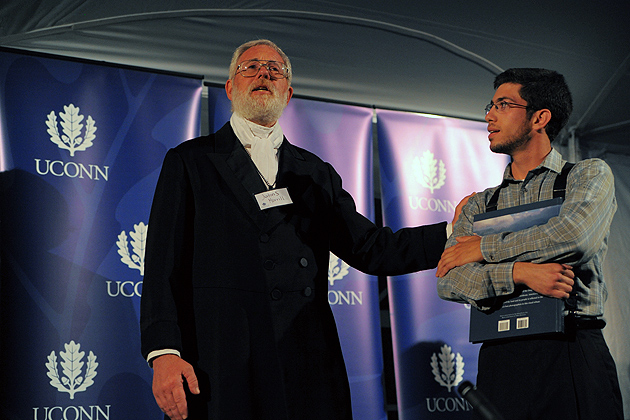[yframe url=’http://www.youtube.com/watch?v=fRqubuhqLn0&feature=youtu.be’]

The College of Agriculture and Natural Resources celebrated the 150th anniversary of the Morrill Act with a symposium explaining the importance of this landmark legislation, followed by a gala “farm-to-table” event on the Great Lawn on Friday.
The legislation, which offered states 30,000 acres of land per U.S. congressman to help endow “a college in every State upon a sure and perpetual foundation, accessible to all, but especially to the sons of toil” was proposed by Vermont Senator Justin Smith Morrill and signed into law by President Abraham Lincoln in July 1862.
Connecticut was the third state to accept the terms of the grant, which encouraged establishment of agricultural and mechanical [engineering] colleges and fostered the ideas of education, research, and outreach that are the bedrock of the land-grant university system.
Keynote speaker at the evening event was Kevin Concannon, Under Secretary for Food, Nutrition, and Consumer Services in the U.S. Department of Agriculture. Concannon, whose connection to UConn dates back to the early 1980s and his days as an adjunct professor in the School of Social Work where he pursued his own graduate education, said, “My courses at UConn focused on public policy and implementation of public systems, and in many ways those are the most important courses I took for my own academic development.”

Noting that the Morrill Act was signed into law at the height of the Civil War, Concannon observed, “You don’t have to go very far outside of Washington, D.C. to see the locations of Civil War encampments where conflict raged, and yet … in the middle of one of the bloodiest wars we’ve ever seen … the Congress of the United States did the right thing and managed to pass this landmark legislation. It makes you wonder what’s the matter with the folks in Washington now!”
In addition to Concannon’s remarks, guests were greeted by Gregory Weidemann, dean of the College of Agriculture and Natural Resources; Steven K. Reviczky, commissioner of the Connecticut Department of Agriculture; and Mun Choi, interim provost.

A surprise guest was Sen. Morrill himself (as portrayed by Richard Weingart), as part of a retrospective provided by the University’s unofficial historian, Mark Roy.
The menu for the evening, planned by UConn’s Department of Dining Services, featured items as diverse as seared Stonington scallops, sour dough baguettes from the UConn bakery, and fresh produce from farms throughout the state. Dennis Pierce, director of Dining Services, introduced each course.
While the mood was festive, Concannon’s remarks brought home the value of work done by researchers, teachers, and students in the College of Agriculture and Natural Resources as he reflected on the importance of good nutrition on our nation’s future. He talked about new dietary guidelines based on sound scientific principles, and the importance of combating the obesity epidemic. He noted that 27 percent of otherwise eligible 17 to 24-year-olds have been identified as being too heavy for military service.
“So many health problems are preventable conditions,” he said, “and when I hear of the vision of the College of Agriculture and Natural Resources, I am encouraged because you recognize the core commitment of land grant universities to support agriculture and to help Americans eat healthier. What you do here … in all the areas of teaching, research, and outreach … is the very best of what was originally hoped for as the role of a land grant university.”


